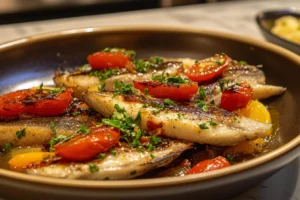Discover the bright, tangy flavor of boquerones and learn how to enjoy them in various dishes.
Experience how boquerones deliver a fresh, savory, and vibrant taste that pleases many palates.
Understanding Boquerones
Boquerones, often known as white anchovies, represent a popular delicacy in Spain. Although you may find them in many coastal regions, they hold a special place in Andalusian cuisine. People create boquerones by marinating fresh anchovies in vinegar, garlic, and herbs. This technique does not rely on heavy salt curing. Instead, it preserves the fish by infusing bright, tangy flavors. These flavors, accordingly, make boquerones a favorite tapa in Spanish bars and restaurants.
Because boquerones rely on fresh anchovies, they taste much milder than salted or aged anchovies. Their marination process involves soaking the fish in a mixture of vinegar and water. This process, therefore, extracts strong fishy notes. As a result, the finished product offers a pleasant flavor that blends gentle acidity, light salinity, and mild umami.
Additionally, people value boquerones for their nutritional content. Although small, these fish provide lean protein and beneficial fatty acids. Boquerones also contain essential vitamins and minerals. Consequently, they appeal to many who seek both taste and health benefits.
Flavor Profile of Boquerones
Salinity and Umami Notes
Boquerones taste less salty than salted anchovies. While they still contain some natural salinity, their vinegar marinade softens harsh edges. As a result, they deliver a balanced flavor. The vinegar imparts a subtle tang, and this acidity interacts nicely with the fish’s mild umami. Also, the fresh anchovy flesh contributes a delicate richness that does not overwhelm the palate.
Freshness and Texture
Because boquerones come from fresh anchovies, they feel tender and moist. Their texture sets them apart from drier, firmer salted anchovies. When you bite into a quality boquerón, you notice a smooth, almost buttery mouthfeel. Altogether, their freshness and gentle taste stand as key reasons for their popularity.
Comparison with Other Similar Seafood
Boquerones differ from other small fish like sardines or salted anchovies. Sardines taste stronger, oilier, and more robust, while salted anchovies deliver an intense, concentrated punch of umami and salt. Boquerones, conversely, occupy a pleasant middle ground. They taste cleaner than sardines and milder than salt-cured anchovies.
Culinary Uses of Boquerones
Common Dishes Featuring Boquerones
Many Spanish tapas bars serve boquerones in vinegar as a simple dish. Diners often enjoy them drizzled with high-quality olive oil, sprinkled with fresh parsley, and topped with minced garlic. Also, cooks add them to salads, sandwiches, or bruschetta. Another option involves using them to garnish pizzas, pastas, or light seafood dishes.
Regional Variations in Recipes
Different Spanish regions put their unique spin on boquerones. Andalusian bars might serve them simply, while Catalonian cooks might combine them with other Mediterranean ingredients. Besides, some areas prefer boquerones with sweet peppers, while others add piquant spices. Regional variations illustrate how flexible boquerones can be in culinary traditions.
Pairing Boquerones with Other Ingredients
Boquerones pair well with many ingredients because they have a mild, tangy taste. For instance, you can serve them with crisp vegetables, like cucumbers or ripe tomatoes, to create a fresh, summery bite. They also complement bright citrus, such as lemon or orange segments. Another good match involves herbs like parsley or basil. Boquerones even pair nicely with light white wines, crusty bread, or mild cheeses.
Comparing Boquerones to Anchovies and Sardines
Key Differences in Taste and Texture
Although people often confuse boquerones with anchovies, they differ significantly. Boquerones come from fresh anchovies marinated in vinegar. Anchovies, especially the salted kind, offer a sharper flavor. Sardines taste oilier and more robust. Boquerones remain mild, tangy, and tender. Anchovies taste saltier and more intense. Sardines deliver more earthy, hearty tones.
Preparation and Preservation Methods
People preserve boquerones by marinating them in vinegar and sometimes water. This process brightens their flavor. On the other hand, salted anchovies age packed in salt for months. Consequently, their taste intensifies. Sardines can appear fresh, grilled, canned, or preserved in oil. Each method influences their flavor profile. Boquerones always emphasize freshness and delicate acidity rather than heavy salinity.
Culinary Applications
Boquerones suit dishes that need subtle seafood notes. For instance, add them to a salad or serve them as a tapa. Salted anchovies work best in recipes that need a savory punch, like Caesar dressing or pasta sauces. Sardines often star in heartier dishes, like grilled preparations or richer stews. Consider what type of flavor you desire when choosing between these fish.
How to Taste Boquerones
Best Practices for Tasting
To fully enjoy boquerones, taste them thoughtfully. First, smell them. They should smell fresh and not overly fishy. Next, observe their color. Bright, shiny flesh suggests freshness. Then, place one on your tongue and let the flavors unfold. Notice the mild vinegar tang and light brininess. Also, consider sipping a crisp white wine to complement their flavors.
What to Look for in Quality Boquerones
High-quality boquerones should appear glossy and moist. They should not smell unpleasant. They should taste bright and clean, with no murky flavors. Because high-quality boquerones rely on freshness, always buy them from a trusted source. Seek out a supplier who respects proper handling and refrigeration. Superior boquerones deliver a gentle fish flavor, balanced by mild acidity.
Enhancing the Tasting Experience
You can improve the flavor of boquerones by serving them with simple extras. For example, drizzle them with a fine extra virgin olive oil and scatter fresh herbs on top. Likewise, pair them with crusty bread, crunchy vegetables, or a squeeze of lemon. Light beers or white wines can also highlight their clean taste. Because their flavor remains subtle, do not overwhelm them with strong sauces or spices.
Buying and Storing Boquerones
Tips for Purchasing Fresh Boquerones
When you shop for boquerones, choose a reputable seafood supplier. Ask the fishmonger how recently they prepared them. Fresh boquerones should have a bright color and no off smells. Because freshness matters, always buy them from sellers who keep their seafood chilled and handle it properly. If possible, taste a small sample before buying a larger amount.
Proper Storage Techniques
Store boquerones in a refrigerator set between 32°F and 38°F (0°C to 3°C). Keep them in their original container or a sealed airtight container. Additionally, consume them within a few days for peak quality. If you need to keep them longer, consider freezing them. Wrap them tightly to prevent freezer burn. Because boquerones taste best when fresh, plan your purchase around when you will eat them.
Shelf Life and Signs of Spoilage
Boquerones do not last long. They generally remain at peak quality for about five days when refrigerated. If they smell sour, appear discolored, or feel slimy, discard them. Never take chances with spoiled seafood. Instead, buy fresh boquerones as needed. Because their charm lies in freshness, enjoy them promptly.
Preparing Boquerones at Home
Step-by-Step Guide to Preparing Boquerones
Preparing boquerones at home allows you to control their taste.
- Clean the Fish: Rinse fresh anchovies under cold water. Remove heads and guts, then rinse again. Pat them dry.
- Marinate in Vinegar: Mix equal parts white vinegar and cold water. Submerge the cleaned anchovies and let them sit for about 30 minutes. The vinegar will gently “cook” the fish and brighten its flavor.
- Drain and Season: Drain the fish and pat them dry again. Arrange them on a plate or dish. Add minced garlic, chopped parsley, and a drizzle of extra virgin olive oil. Sprinkle a small pinch of salt if desired.
- Serve: Serve your boquerones chilled or at room temperature. They taste wonderful as a tapa with crusty bread or with a fresh salad.
Because homemade boquerones allow you to adjust flavors, you can add herbs or spices that suit your taste.
Common Recipes and Serving Suggestions
A simple way to serve boquerones involves placing them on toasted bread with tomato slices and a drizzle of olive oil. Another idea involves mixing them into a fresh green salad. For a pasta dish, consider adding chopped boquerones to linguine with garlic and olive oil. Because they taste mild, they blend effortlessly into many recipes without overpowering other flavors.
Tips for Enhancing Flavor
If you want stronger flavors, consider adding chili flakes, lemon zest, or fresh basil. Also, letting them marinate a bit longer in vinegar can deepen their tanginess. Conversely, if you prefer a more delicate flavor, reduce marination time. Additionally, choose a high-quality olive oil since it can elevate their taste. Adjusting herbs and seasoning allows you to find your perfect balance.
Health Benefits of Boquerones
Nutritional Content and Benefits
Boquerones offer lean protein that supports muscle maintenance and repair. They also provide omega-3 fatty acids, which support heart health. Moreover, they include essential vitamins and minerals, such as vitamin B12, selenium, and phosphorus. These nutrients contribute to overall wellness. Because boquerones come from small fish, they generally contain less mercury than some larger species.
Comparison with Other Seafood
Compared to salted anchovies, boquerones provide a fresher taste and less sodium. Sardines offer more calcium and vitamin D, but they also taste stronger. Boquerones provide a balanced choice for those who want subtle flavor and lean protein without overwhelming salt. Because they pair well with fresh produce and whole grains, they fit nicely into many healthy eating plans.
Incorporating Boquerones into a Healthy Diet
Boquerones complement many diets. You can add them to salads for extra protein. Also, pair them with whole-grain bread or toss them into vegetable-packed dishes. Their mild flavor helps them blend into many cuisines. Because they contain beneficial fatty acids, consider eating them regularly as part of a balanced diet. Their light, clean taste makes them an easy seafood choice.
Frequently Asked Questions
What’s the difference between boquerones and anchovies?
A common question is whether boquerones are the same as anchovies. While both are small, oily fish, the key difference lies in their preparation. What’s the difference between boquerones and anchovies? While anchovies are typically salted and packed in oil, boquerones are marinated in vinegar and olive oil, offering a fresher, less intense flavor.
Are boquerones sardines?
No. Boquerones and sardines are not the same. Sardines belong to a different species and taste richer and oilier. Boquerones, however, use fresh anchovies. People marinate them in vinegar for a cleaner flavor.
What do boquerones taste like?
Boquerones taste mild, tangy, and slightly salty. They deliver a fresh flavor with gentle acidity and subtle umami notes. They lack the intense saltiness of salted anchovies and the strong fishiness of sardines.
Are boquerones white anchovies?
Yes. Many people refer to boquerones as white anchovies. When marinated in vinegar, their flesh turns pale and tender. This process transforms fresh anchovies into a delicacy known for brightness and delicate taste.
Conclusion
Boquerones delight eaters with their gentle tang, mild saltiness, and subtle umami. They strike a pleasing balance between strong flavors like salted anchovies and more robust options like sardines. Because they adapt to many dishes and pair well with a variety of ingredients, boquerones fit seamlessly into different cuisines. Understanding what boquerones taste like helps you appreciate their unique charm. Whether you serve them as a simple tapa or incorporate them into a salad, boquerones bring freshness and complexity to your table.
Are boquerones sardines? You’ll find that while both come from the same general family of fish, they differ significantly in size, flavor, and texture.



